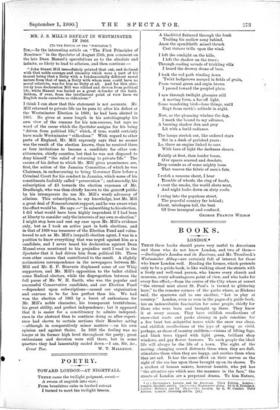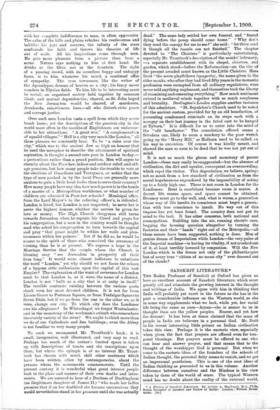BOOKS.
LONDON.*
THESE three books should prove very useful to Americans and those who do not know London, and two of them- -Darlington's London and its Environs, and Mr. Troutbeck's Westminster Abbey—are certainly full of interest for those who know London well. Reading the former, which pretends only to be a guide-book, is like walking about the streets with a lively and well-read person, who knows every church and museum, every advantageous point of view, and who looks for every fine effect,—from the centre of the City where at sunset "the eternal mist about St. Paul's is turned to glittering haze," to the remoter corners of the parks where, as Dickens said, the sparrows call to one another, "Let us play at country." London, even as seen in the pages of a guide-book, has an indescribable fascination for some people, chiefly for those who were born and brought up there. They know it at every season. They have childish recollections of snow-clad roofs and parks shining in pale sunshine for a few brief but delightful hours while the snow was clean, and childish recollections of the joys of spring as vivid, perhaps, as those of country children,—visions of lifting fogs, and black trees tipped with light green, brilliant shop windows, and gay flower barrows. To such people the ideal life will always be the life of a town. The sight of the moving, changing crowd distracts them when they are dull, stimulates them when they are happy, and soothes them when they are sad. It has the same effect on their nerves as the sight of the sea has upon those brought up on its shores. To a student of human nature, however humble, who yet has "the attentive eye which sees the manners in the face," the streets of London are a perpetual drama. To him Nature, • (1.) Darlington's London cued its Environs. Third Edition. London; stmpkin, Marshall, And Co. [bs.]-12.) Westmiruiter Abbey. By G. E. Trontbeck. London . Methuen and Co. (Ss.]—(3) London. By G. W. Cunciall. Third Edition. London : Greening and CO. [6d.3 with her complete indifference to man, is often oppressive The calm of the hills and pining rebukes his restlessness and belittles his joys and sorrows, the infinity of the stars confounds his faith and throws • his theories of life out of scale. All his inspirations come through men. He gets more pleasure from apicture than from a scene. Nature says nothing to him at first hand. He drinks at the filter, not at the fountain. The sight of a passing crowd, with its countless happy and tmhappy fazes, is to him, whatever his mood, a continual offer of sympathy. The true townsman, like the writer of the Apocalypse, dreams of heaven as a city ; his fancy never wanders in Elysian fields. To him life to be interesting must be social; an organised society held together by common ideals and mutual dependencies; cleared, as St. John hoped the New Jerusalem would be cleared, of murderers, drunkards, extortioners, liars,—all who disturb civic peace and corrupt justice.
Over such men London casts a spell from which they never break loose; yet the descriptions of the greatest city in the world most often in the mouths of Englishmen are unfavour- able to her attractions. "A great wen," "A conglomeration of squalid villages," "Hell is a city very much like London," all these phrases we constantly hear. To be "a ruler over the city," which was to the ancient Jew so high an honour that he used the metaphor to describe the attainment of spiritual aspiration, is thought a second-rate post in London to-day,— a pretentious rather than a proud position. Men will argue to eternity about the Poor-law, indoor and outdoor relief, and old- age pensions, but how many people take the trouble to vote at the elections of Guardians and Vestrymen, or notice that the type of men pushed in by the local Press are generally more anxious to gain a little local kudos than to serve their country? How many people have any idea how much power is in the bands of a master of a Metropolitan workhouse, or what number of children are educated in Poor-law schools ? Municipal office, from the Lord Mayor's to the relieving officer's, is ridiculed. London is loved, but London is not respected; to serve her is never the highest honour, whether the service be given for love or money. The High Church clergyman still turns towards Jerusalem when he repeats his Creed and prays for his congregation, but a man in the country would be thought mad who asked his congregation to turn towards the capital and pray "that peace might be within her walls and plen- teousness within her palaces." Yet if he did so, he would be nearer to the spirit of those who conceived the ceremony of turning than he is at present. We express a hope in the Marriage Service that the couple whom the Church is blessing may "see Jerusalem in prosperity all their lives long." It would seem almost ludicrous to substitute the word "London," yet why should we not focus the echoes of a bygone civic enthusiasm upon the capital of this vast Empire ? The explanation of the want of reverence for London must be that London is, as it were, the name of a district. London is not "built as a city that is at unity in itself." The terrible contrasts existing between the various parts shock even her most devoted children. It is not fax from Lisson Grove to Portman Square, or from Trafalgar Square to Seven Dials, but if we go from the one to the other we, as it were, change our city. To which city does the Londoner owe his allegiance? In Whitechapel we forget Westminster, and in the monotony of the workman's suburb who remembers the stately variety of the river? We ought to think more than we do of our Cathedrals and fine buildings ; even the Abbey is not familiar to very many people.
To such we recommend Mr. Troutbeck's book; it is small, inexpensive, well illustrated, and very easy to read. Perhaps too much of the author's limited space is taken up with descriptions of tombs and the inscriptions upon them, but where the epitaph is of no interest Mr. Trout- beck has chosen with much skill other sentences which have been written, often by contemporaries, about the persons whom the monuments commemorate. Until the present century it is wonderful what great interest people took in the place and manner of their own deaths and inter- ments. We are amused to hear of a Duchess of Buckingham (an illegitimate daughter of James II.) "who made her ladies promise that if on her deathbed she became unconscious they would nevertheless stand in her presence until she was actually
dead." The same lady settled her own funeral, and "feared dying before the pomp should come home." "Why don't they send the canopy, for me to see ? " she said; " let them send it though all the tassels are not finished." The chapter devoted to "The Cloisters" is particularly entertaining, especially Mr. Troutbeck's description of the monks' infirmary, —a separate establishment with its chapel, cloister!, and garden, which stood7-before. the Reformatiell÷en the site of the present arcaded court known as the Little Cloisters: Here lived "the seven playfellows (sympect ), the name given to the elder monks, who after they had lived fifty years in the monastic- profession were exempted from all ordinary regulations, were never told anything unpleasant, and themselves took the liberty of examining and censuring everything." How much sentiment existed in medieval minds together with so much roughness and brutality. Darlington's London supplies another instance of this admixture. "St. Sepulchre's Church used to be noted for the ancient custom, provided for by an old benefaction, of presenting condemned criminals on its steps each with a nosegay on their last journey in the fated cart to be hanged at Tyburn." It is difficult for us to enter into the mind of the "old benefactor." The consolation offered seems a frivolous one, likely to seem a mockery to the poor wretch going up the "Heavy Hill," as Holborn used to be called, on his way to execution. Of course it was kindly meant, and showed the man so soon to be dead that he was not yet out of mind.
It is not so much the gloom and monotony of poorer London—these may easily be exaggerated—but the absence of civilisation, the dirt and squalor, consequent on overcrowding, which repel the visitor. This degradation, we believe, springs not so much from a low standard of civilisation as from the moral hopelessness engendered by the impossibility of acting up to a fairly high one. There is not room in London for the Londoners. Rent is exorbitant because room is scarce. A decent life means space, and space cannot be obtained. Decency must go to the wall, and, what is worse, a generation whose way of life insults its conscience DMA beget a genera- tion with less conscience to insult. No way out of this - impasse has yet been found. The country does not put its mind to the task. It has other concerns, both national and cosmopolitan. Building into the air, running electric cars, begging the housing question altogether by turning the factories and their " hands " right out of the Metropolis,—all these means have been suggested, nothing is done. Men of genius dream of Imperialism while London—the very pulse of the Imperial machine—is having its vitality, if not crushed ont of it, at least terribly lowered by congestion. Will the New London which is the dream not only of the philanthropist but of every true "citizen of no mean city" ever descend out of the clouds?



































 Previous page
Previous page